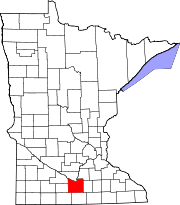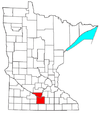Eagle Lake, Minnesota
Eagle Lake | |
|---|---|
 Location of Eagle Lake, Minnesota | |
| Coordinates: 44°9′40″N 93°52′57″W / 44.16111°N 93.88250°W | |
| Country | United States |
| State | Minnesota |
| County | Blue Earth |
| Government | |
| • Type | Mayor - Council |
| • Mayor | Tim Auringer[1] |
| Area | |
| • Total | 1.55 sq mi (4.02 km2) |
| • Land | 1.55 sq mi (4.02 km2) |
| • Water | 0.00 sq mi (0.01 km2) |
| Elevation | 1,010 ft (308 m) |
| Population (2020) | |
| • Total | 3,278 |
| • Density | 1,990.33/sq mi (768.62/km2) |
| Time zone | UTC-6 (Central (CST)) |
| • Summer (DST) | UTC-5 (CDT) |
| ZIP code | 56024 |
| Area code(s) | 507 |
| FIPS code | 27-17378 |
| GNIS feature ID | 0643025[3] |
| Website | EagleLakeMN.com |
Eagle Lake is in Blue Earth County, Minnesota, United States. The population was 3,278 at the 2020 census.[4] It is part of the Mankato-North Mankato Metropolitan Statistical Area.
U.S. Route 14 and Minnesota State Highway 60 are two of the main arterial routes in the community.
History[]
Eagle Lake was platted in 1872.[5] It was named after nearby Eagle Lake.[6] A post office has been in operation in Eagle Lake since 1873.[7]
Geography[]
According to the U.S. Census Bureau, the city has an area of 1.61 square miles (4.17 km2), all land.[8]
Demographics[]
| Historical population | |||
|---|---|---|---|
| Census | Pop. | %± | |
| 1910 | 231 | — | |
| 1920 | 231 | 0.0% | |
| 1930 | 222 | −3.9% | |
| 1940 | 269 | 21.2% | |
| 1950 | 310 | 15.2% | |
| 1960 | 506 | 63.2% | |
| 1970 | 839 | 65.8% | |
| 1980 | 1,470 | 75.2% | |
| 1990 | 1,703 | 15.9% | |
| 2000 | 1,787 | 4.9% | |
| 2010 | 2,422 | 35.5% | |
| 2020 | 3,278 | 35.3% | |
| U.S. Decennial Census[9] 2020 Census[4] | |||
2010 census[]
As of the census[10] of 2010, there were 2,422 people, 887 households, and 650 families living in the city. The population density was 1,504.3 inhabitants per square mile (580.8/km2). There were 931 housing units at an average density of 578.3 per square mile (223.3/km2). The racial makeup of the city was 95.5% White, 1.4% African American, 0.3% Native American, 0.8% Asian, 0.6% from other races, and 1.5% from two or more races. Hispanic or Latino of any race were 2.8% of the population.
There were 887 households, of which 41.4% had children under the age of 18 living with them, 59.5% were married couples living together, 8.1% had a female householder with no husband present, 5.6% had a male householder with no wife present, and 26.7% were non-families. 18.9% of all households were made up of individuals, and 3.2% had someone living alone who was 65 or older. The average household size was 2.73 and the average family size was 3.13.
The median age in the city was 31.7. 28.7% of residents were under 18; 8.5% were between the ages of 18 and 24; 32.4% were from 25 to 44; 23.7% were from 45 to 64; and 6.6% were 65 or older. The gender makeup of the city was 50.5% male and 49.5% female.
2000 census[]
As of the 2000 census, there were 1,787 people, 651 households, and 481 families living in the city. The population density was 1,485.0 people per square mile (575.0/km2). There were 663 housing units at an average density of 551.0 per square mile (213.3/km2). The racial makeup of the city was 96.98% White, 0.67% African American, 0.22% Native American, 0.56% Asian, 0.50% from other races, and 1.06% from two or more races. Hispanic or Latino of any race were 1.40% of the population.
There were 651 households, of which 45.9% had children under 18 living with them, 58.1% were married couples living together, 11.5% had a female householder with no husband present, and 26.0% were non-families. 19.4% of all households were made up of individuals, and 3.2% had someone living alone who was 65 or older. The average household size was 2.75 and the average family size was 3.17.
In the city, the population was spread out, with 31.8% under 18, 9.6% from 18 to 24, 35.1% from 25 to 44, 19.0% from 45 to 64, and 4.5% who were 65 or older. The median age was 30. For every 100 females, there were 104.7 males. For every 100 females 18 and over, there were 96.6 males.
The median income for a household in the city was $46,413, and the median income for a family was $54,167. Males had a median income of $33,313 versus $23,520 for females. The per capita income was $17,574. About 5.1% of families and 6.9% of the population were below the poverty line, including 7.1% of those under 18 and 7.7% of those 65 or older.
Eagle Lake Tator Days[]
Every third weekend of July, Eagle Lake celebrates Tator Days. Events usually include a Miss Eagle Lake queen coronation on Thursday, a grand parade Saturday afternoon and a fundraising breakfast Sunday morning. The American Legion gives free french fries to those sporting Tator Days raffle buttons.
References[]
- ^ "Tim Auringer Appointed Eagle Lake Mayor". February 13, 2018.
- ^ "2019 U.S. Gazetteer Files". United States Census Bureau. Retrieved July 26, 2020.
- ^ "U.S. Board on Geographic Names". United States Geological Survey. October 25, 2007. Retrieved January 31, 2008.
- ^ a b "2020 Census Redistricting Data (Public Law 94-171) Summary File". American FactFinder. U.S. Census Bureau. Retrieved February 23, 2022.
- ^ Upham, Warren (1920). Minnesota Geographic Names: Their Origin and Historic Significance. Minnesota Historical Society. p. 59.
- ^ Chicago and North Western Railway Company (1908). A History of the Origin of the Place Names Connected with the Chicago & North Western and Chicago, St. Paul, Minneapolis & Omaha Railways. p. 66.
- ^ "Blue Earth County". Jim Forte Postal History. Retrieved March 16, 2015.
- ^ "U.S. Gazetteer files 2010". U.S. Census Bureau. Archived from the original on July 2, 2012. Retrieved November 13, 2012.
- ^ United States Census Bureau. "Census of Population and Housing". Retrieved September 12, 2013.
- ^ "U.S. Census website". United States Census Bureau. Retrieved November 13, 2012.
Coordinates: 44°09′54″N 93°52′53″W / 44.16500°N 93.88139°W
- Cities in Blue Earth County, Minnesota
- Cities in Minnesota
- Mankato – North Mankato metropolitan area
- 1872 establishments in Minnesota


